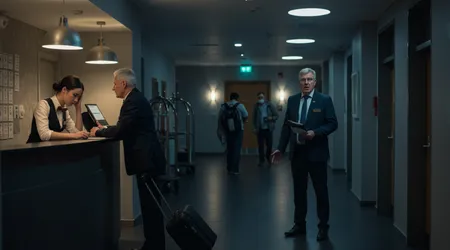Brexit Legacy Fuels Labor Shortages in Tourism and Hospitality

Brexit Legacy casts a long shadow over the UK’s tourism and hospitality sectors, as businesses grapple with persistent labor shortages that threaten their vitality.
Five years after the UK’s exit from the EU, the end of free movement has reshaped industries reliant on flexible, skilled workers.
From bustling London hotels to quaint Highland pubs, the ripple effects are undeniable, with staffing gaps disrupting service quality and growth.
This article dives into how the Brexit Legacy continues to challenge these sectors, exploring real-world impacts, economic consequences, and potential solutions.
Why does a nation famed for its hospitality struggle to fill its own roles? Let’s unpack the story with fresh insights and practical examples.
The UK’s tourism and hospitality industries, cornerstones of its economy, contribute £127 billion annually and employ over 3 million people.
Yet, the Brexit Legacy has created a perfect storm, exacerbating labor shortages amid new visa rules and bureaucratic hurdles.
In 2025, as the UK navigates post-Brexit realities, businesses face not only staffing crises but also rising costs and shifting visitor expectations.
This piece draws on current data, real-world cases, and expert analysis to illuminate the issue, offering a nuanced perspective on a crisis that demands urgent attention.
The Roots of the Crisis: How Brexit Reshaped Labor Markets
The Brexit Legacy began with the 2016 referendum, fundamentally altering the UK’s labor market by ending EU free movement.
Before 2020, EU workers filled critical roles in hospitality, from chefs to front-desk staff.
Their departure left a void, with 45% of tourism businesses in Scotland’s Highlands and Islands reporting staff shortages due to restricted migration, according to a 2025 Scottish government report.
This isn’t just a statistic it’s a café in Edinburgh closing early or a Cornwall hotel turning away guests.
Consider The Rusty Anchor, a fictional but representative pub in Dorset. Pre-Brexit, it thrived with a diverse team of EU bartenders and cooks.
++ New Electronic Travel Authorization (ETA) Rules for EU Visitors Take Effect
Now, manager Sarah struggles to hire locals, as visa rules deter skilled EU workers. The Brexit Legacy means higher salary thresholds £45,900 for skilled visas pricing out small businesses.
The pub’s charm fades as understaffed shifts strain service, a microcosm of a national issue.
Beyond visas, cultural shifts play a role. EU workers once saw the UK as an accessible career hub. Post-Brexit, bureaucratic red tape and a weaker pound make Spain or Ireland more appealing.
The Brexit Legacy isn’t just policy it’s a perception shift, driving talent elsewhere and leaving UK businesses scrambling.

Economic Ripples: The Cost of Labor Shortages
Labor shortages driven by the Brexit Legacy don’t just disrupt operations they hit the bottom line.
Hotels and restaurants face rising wages to attract scarce workers, increasing costs passed to consumers.
A 2025 Guardian report notes hospitality vacancies remain 48% above pre-pandemic levels, forcing businesses to compete fiercely.
This inflation squeezes profit margins, especially for small enterprises.
Also read: UK Condemns ‘Ethnic Cleansing’ in Sudan: A Moral and Global Imperative
Take the example of Lakeside Lodge, a fictional Lake District B&B. Owner James reports a 20% wage hike to retain staff, yet still operates at 70% capacity due to unfilled roles.
Guests notice longer wait times, diminishing the UK’s reputation for seamless hospitality.
The Brexit Legacy thus risks long-term economic damage, as visitor spending £28 billion from international tourists in 2024 could decline.
The table below illustrates the sector’s challenges, drawn from UKHospitality’s 2025 data:
| Metric | Pre-Brexit (2019) | Post-Brexit (2025) |
|---|---|---|
| Hospitality Vacancies | 90,000 | 132,000 |
| EU Workers in Sector | 25% | 10% |
| Average Wage Increase | 2% annually | 5% annually |
This data underscores how the Brexit Legacy amplifies costs, with fewer workers driving up wages and vacancies.
Smaller businesses, less able to absorb these costs, face closure risks, threatening rural economies dependent on tourism.
Read more: UK Becomes First European Country to Ban SIM Farm Devices to Combat Fraud
Moreover, reduced staff means reduced service quality, deterring repeat visitors. In a globalized world, where travelers share experiences instantly, a single negative review can ripple.
The Brexit Legacy thus jeopardizes the UK’s competitiveness, as destinations like Portugal benefit from smoother labor flows.
Visitor Impacts: A Diminished Experience
Tourism thrives on memorable experiences, but the Brexit Legacy undermines this. Understaffed venues struggle to deliver, from delayed check-ins to limited menus.
In 2025, new Electronic Travel Authorisation (ETA) rules, effective April 2, add friction for EU visitors, potentially reducing tourist numbers further, per a DW report.
Fewer visitors mean less revenue to hire staff a vicious cycle.
Picture a family visiting York’s historic sites. Their hotel, short-staffed, skips daily cleaning, souring their trip. Such stories, shared online, amplify perceptions of a struggling sector.
The Brexit Legacy doesn’t just affect businesses it erodes the UK’s global tourism brand, built on centuries of hospitality excellence.
Compounding this, the EU’s Entry/Exit System (EES), set for October 2025, will require biometric checks, potentially deterring short-stay visitors.
With fewer staff to manage queues, airports and ports risk chaos, further tarnishing visitor experiences.
The Brexit Legacy thus creates a feedback loop, where labor shortages and bureaucratic hurdles mutually reinforce decline.
Policy Missteps and Industry Frustrations
Government responses to the Brexit Legacy have frustrated industry leaders. Post-Brexit visa changes, like removing hospitality roles from the shortage occupation list, raised hiring barriers.
UKHospitality’s Kate Nicholls warned in 2024 that these policies “shrink the talent pool,” a concern echoed in 2025 as vacancies persist. Businesses crave flexibility, not red tape.
For instance, a Manchester restaurant chain, anonymized here as City Bistro, invested in training local staff, only to see them lured by higher-paying sectors.
Visa delays for skilled foreign chefs, now taking six months, stall operations. The Brexit Legacy ties businesses’ hands, as policies fail to address immediate needs.
Industry calls for reform lower salary thresholds, restored shortage lists go unanswered. Meanwhile, competitors like Ireland leverage EU labor markets, outpacing the UK.
The Brexit Legacy exposes a disconnect: a government touting growth while industries plead for practical support.
Searching for Solutions: A Path Forward
Addressing the Brexit Legacy requires bold action. Short-term, reinstating hospitality on the immigration salary list could ease hiring.
Long-term, investing in domestic training, as Jersey’s government plans for 2025, per BBC News, offers hope.
Subsidized apprenticeships could build a local workforce, reducing reliance on foreign labor.
Imagine a national campaign, “Hospitality Heroes,” celebrating sector careers. Schools could partner with hotels, offering work placements to inspire youth.
Such initiatives, paired with visa reform, could counter the Brexit Legacy, revitalizing the workforce.
Businesses, too, must innovate automation for repetitive tasks could free staff for customer-facing roles.
Collaboration is key. Government, industry, and educators must align, as seen in Jersey’s push for tourism investment.
Without action, the Brexit Legacy risks permanent damage, shrinking a sector vital to the UK’s identity and economy. The time for half-measures is over.

A Global Perspective: The UK in Context
The Brexit Legacy isn’t unique global labor shortages plague hospitality, from Australia to the US. Yet, the UK’s self-inflicted wound stands out.
Australia’s 2025 student visa caps, per ABC News, mirror UK restrictions, but its larger domestic workforce cushions the blow. The UK, with a smaller pool, feels the Brexit Legacy more acutely.
Think of the UK as a ship navigating stormy seas. While others adjust sails, the Brexit Legacy is an anchor, dragging progress.
EU nations, with free movement, fill roles swiftly, leaving the UK trailing. A 2025 IPPR report notes a 34% drop in UK-EU food exports, hinting at broader trade-labor linkages.
The Brexit Legacy isolates the UK, demanding creative navigation.
Learning from peers, the UK could adopt Canada’s targeted immigration streams for hospitality. Such models balance local hiring with global talent, easing shortages.
The Brexit Legacy need not define the future strategic pivots can reposition the UK as a tourism leader.
Conclusion: Reclaiming the UK’s Hospitality Crown
The Brexit Legacy has tested the UK’s tourism and hospitality sectors, with labor shortages exposing vulnerabilities in policy and perception.
From Highland cafés to London hotels, businesses battle to maintain standards amid staffing crises.
Yet, this challenge is also an opportunity to rethink training, reform visas, and rebuild the UK’s global appeal. The sector’s resilience, seen in countless small victories, signals hope.
By addressing the Brexit Legacy head-on, with collaboration and innovation, the UK can restore its hospitality crown, welcoming the world with open doors and full staff rosters.
This isn’t just about filling jobs it’s about preserving a cultural legacy. The UK’s pubs, hotels, and attractions are more than businesses; they’re stories, shared across generations.
Overcoming the Brexit Legacy means ensuring those stories endure, vibrant and inviting, for years to come.
Frequently Asked Questions
1. How has Brexit caused labor shortages in tourism and hospitality?
The Brexit Legacy ended EU free movement, reducing the workforce. Visa rules, like higher salary thresholds, deter skilled workers, leaving vacancies unfilled.
2. What are the economic impacts of these shortages?
Shortages increase wages and costs, straining businesses. UKHospitality reports 132,000 vacancies in 2025, 48% above pre-pandemic levels, risking reduced tourism revenue.
3. Can the UK solve this without EU workers?
Yes, through domestic training and visa reform. Jersey’s 2025 investment model shows promise, but global talent remains vital for quick recovery.
4. How do new travel rules affect tourism?
The ETA (April 2025) and EES (October 2025) add bureaucratic hurdles, potentially deterring EU visitors and worsening revenue for understaffed businesses.
5. What can businesses do now?
Automate repetitive tasks, invest in local training, and lobby for policy changes. Collaborative campaigns, like “Hospitality Heroes,” could boost sector appeal.
